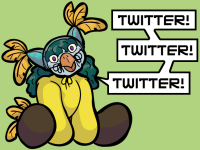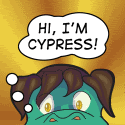Do You Make These Common Mistakes in your Dialogue?
(It's worth note here that we're not talking about text bubble placement; though that's important too, there's a better tutorial for that and I don't feel like going into all the image-worthy details when this is mostly ending up in a teensy sidebar blog.)
As most critics will happily point out, most comic artists aren't the best when it comes to writing (or worse, have an inflated idea of what their writing skills actually are.) Since the majority of the writing in webcomics is located in the dialogue, it's the easiest part of a storyline which can be targeted. After all, without much else to do within a comic, the writing may very well be what saves your work.
- "Hm?" Short pepperings of dialogue are common in modern society, but unless you're writing in a modern setting, it could range from completely inappropriate to totally unrealistic. Since word bubbles take up a significant part of usable space on a comic page, you cannot and should not allow for these small 'grunts' of text within your conversations. Also, it provides a way for one character to dominate a conversation when perhaps they shouldn't be.
- Exception: Nonverbal/Barely Verbal Characters. In a society that expects people to talk, a person who consciously refuses or is unable to will stand out. Use it as a character trait, but ONLY for that person; you may be able to justify it as a group trait if you're really clever with it.
- Exception: Nonverbal/Barely Verbal Characters. In a society that expects people to talk, a person who consciously refuses or is unable to will stand out. Use it as a character trait, but ONLY for that person; you may be able to justify it as a group trait if you're really clever with it.
- "As you know . . . [exposition here]" Well, okay, genius; if they already know it, why are you telling us again? This is commonly related to having the "new guy" in the group as a plot device to force more experienced characters to constantly have to explain their actions to others. Exposition in anything (let alone in comics) is a Bad Thing, but in comics it means the dreaded walls of text. The more manageable chunks you can break your work down into, the better.
- "[Insert Cliché Line of Dialogue here]" This is a gimme. The Villain's One-Liner as he escapes arrest, the 'witty' last line of dialogue at the end of a cartoon, anything that makes you groan as you've heard it so many times before. If you don't like it, neither do your fans. Spare everyone the drama.
- Everyone talking in the same tone of voice as everyone else. More forgivable in a high-school drama (barely), completely unforgivable everywhere else. If you have a series of diverse characters from diverse backgrounds, you damn well better give them diverse voices as well. This goes back to 'character traits', and mastering the voices of your characters will go a long way to cementing the way people pick up on the plot. Even when cursing or getting into adult dialogue, remember; there's a whole lot of ways to say "sex" but each one has its own implications and times when one form is appropriate over another. (Your doctor says "intercourse", your mother says "making love", your drunken best friend says "porking" . . . you get the idea.)
- "[Almost indecipherable wall of text here that's just so unbelievably long and located in a block of text so big that it crowds out the rest of the panel to the point that nothing else can get said . . .]" Get the picture?
Then again, if that happens to your comic, consider yourself lucky.
Labels: commandments, content, creativity, tips







0 Comments:
Post a Comment
Subscribe to Post Comments [Atom]
<< Home